Entrepreneurship and Small Business Management in London Boroughs
VerifiedAdded on 2023/01/18
|17
|4663
|62
Report
AI Summary
This report analyzes entrepreneurial ventures within the London boroughs, covering various types such as social, small, large growth, medium growth, public, and private ventures, along with their typologies like lifestyle and scalable ventures. It highlights the similarities and differences between these ventures, focusing on annual growth rates, time horizons, managerial focus, technology investment, exit strategies, and sources of finance. The report also assesses the impact of small and micro-businesses on the UK economy using data and statistics, emphasizing their role in employment and GDP growth. Furthermore, it discusses the skills, characteristics, and traits of successful entrepreneurs, linking entrepreneurial personality to motivation. The report concludes by examining the backgrounds of entrepreneurs and their contributions to social and economic development.

Entrepreneurship and Small
Business Management
Business Management
Paraphrase This Document
Need a fresh take? Get an instant paraphrase of this document with our AI Paraphraser
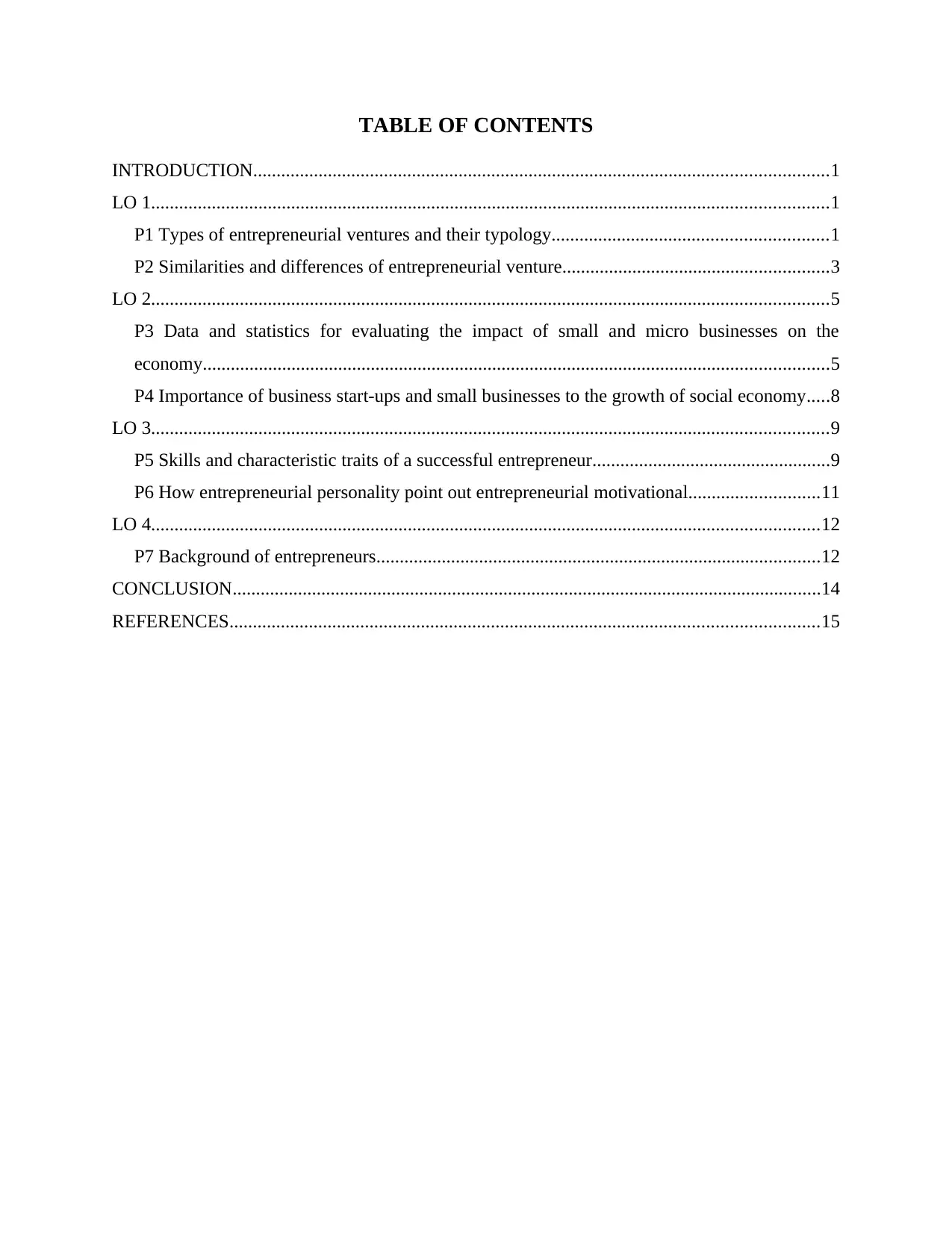
TABLE OF CONTENTS
INTRODUCTION...........................................................................................................................1
LO 1.................................................................................................................................................1
P1 Types of entrepreneurial ventures and their typology...........................................................1
P2 Similarities and differences of entrepreneurial venture.........................................................3
LO 2.................................................................................................................................................5
P3 Data and statistics for evaluating the impact of small and micro businesses on the
economy......................................................................................................................................5
P4 Importance of business start-ups and small businesses to the growth of social economy.....8
LO 3.................................................................................................................................................9
P5 Skills and characteristic traits of a successful entrepreneur...................................................9
P6 How entrepreneurial personality point out entrepreneurial motivational............................11
LO 4...............................................................................................................................................12
P7 Background of entrepreneurs...............................................................................................12
CONCLUSION..............................................................................................................................14
REFERENCES..............................................................................................................................15
INTRODUCTION...........................................................................................................................1
LO 1.................................................................................................................................................1
P1 Types of entrepreneurial ventures and their typology...........................................................1
P2 Similarities and differences of entrepreneurial venture.........................................................3
LO 2.................................................................................................................................................5
P3 Data and statistics for evaluating the impact of small and micro businesses on the
economy......................................................................................................................................5
P4 Importance of business start-ups and small businesses to the growth of social economy.....8
LO 3.................................................................................................................................................9
P5 Skills and characteristic traits of a successful entrepreneur...................................................9
P6 How entrepreneurial personality point out entrepreneurial motivational............................11
LO 4...............................................................................................................................................12
P7 Background of entrepreneurs...............................................................................................12
CONCLUSION..............................................................................................................................14
REFERENCES..............................................................................................................................15
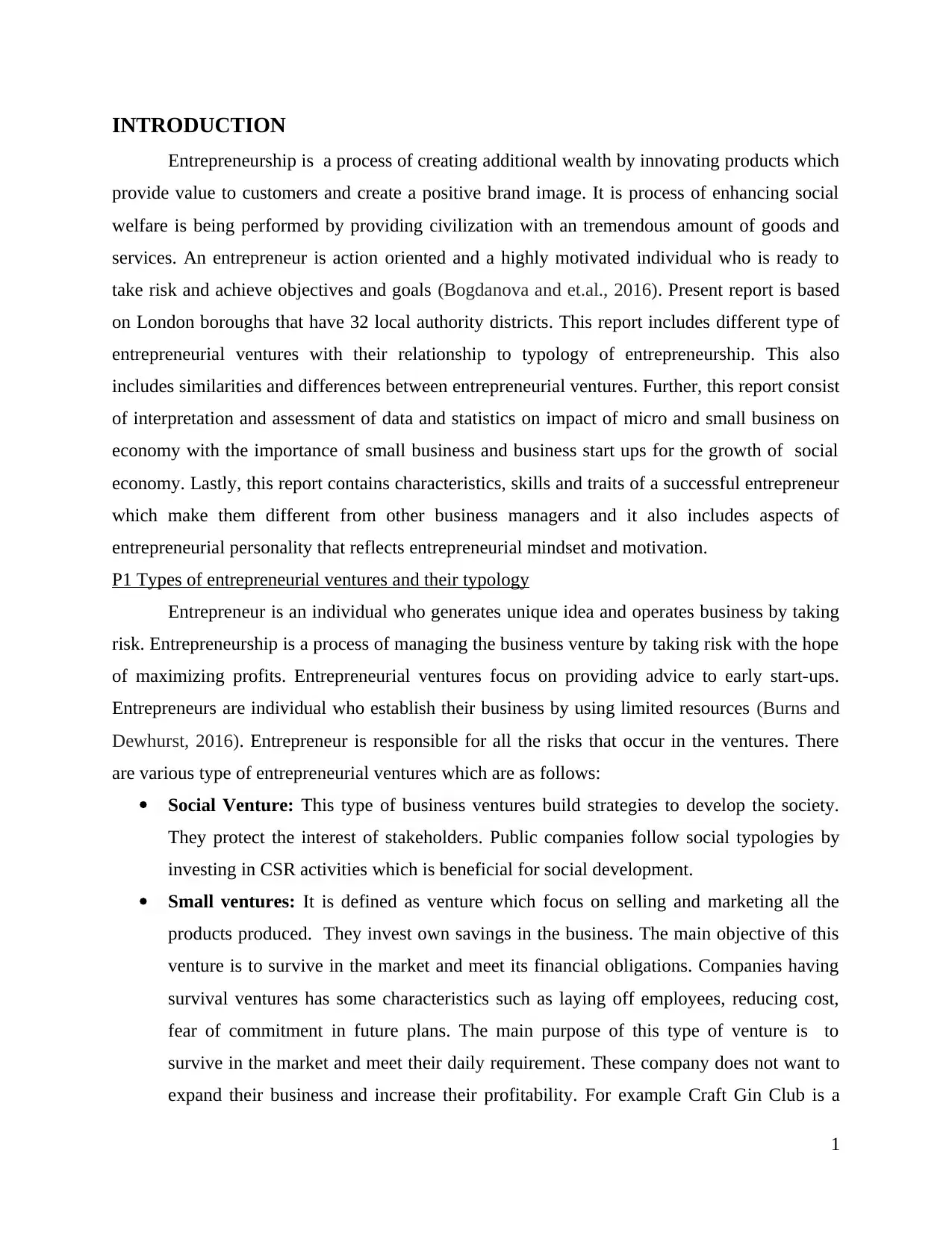
INTRODUCTION
Entrepreneurship is a process of creating additional wealth by innovating products which
provide value to customers and create a positive brand image. It is process of enhancing social
welfare is being performed by providing civilization with an tremendous amount of goods and
services. An entrepreneur is action oriented and a highly motivated individual who is ready to
take risk and achieve objectives and goals (Bogdanova and et.al., 2016). Present report is based
on London boroughs that have 32 local authority districts. This report includes different type of
entrepreneurial ventures with their relationship to typology of entrepreneurship. This also
includes similarities and differences between entrepreneurial ventures. Further, this report consist
of interpretation and assessment of data and statistics on impact of micro and small business on
economy with the importance of small business and business start ups for the growth of social
economy. Lastly, this report contains characteristics, skills and traits of a successful entrepreneur
which make them different from other business managers and it also includes aspects of
entrepreneurial personality that reflects entrepreneurial mindset and motivation.
P1 Types of entrepreneurial ventures and their typology
Entrepreneur is an individual who generates unique idea and operates business by taking
risk. Entrepreneurship is a process of managing the business venture by taking risk with the hope
of maximizing profits. Entrepreneurial ventures focus on providing advice to early start-ups.
Entrepreneurs are individual who establish their business by using limited resources (Burns and
Dewhurst, 2016). Entrepreneur is responsible for all the risks that occur in the ventures. There
are various type of entrepreneurial ventures which are as follows:
Social Venture: This type of business ventures build strategies to develop the society.
They protect the interest of stakeholders. Public companies follow social typologies by
investing in CSR activities which is beneficial for social development.
Small ventures: It is defined as venture which focus on selling and marketing all the
products produced. They invest own savings in the business. The main objective of this
venture is to survive in the market and meet its financial obligations. Companies having
survival ventures has some characteristics such as laying off employees, reducing cost,
fear of commitment in future plans. The main purpose of this type of venture is to
survive in the market and meet their daily requirement. These company does not want to
expand their business and increase their profitability. For example Craft Gin Club is a
1
Entrepreneurship is a process of creating additional wealth by innovating products which
provide value to customers and create a positive brand image. It is process of enhancing social
welfare is being performed by providing civilization with an tremendous amount of goods and
services. An entrepreneur is action oriented and a highly motivated individual who is ready to
take risk and achieve objectives and goals (Bogdanova and et.al., 2016). Present report is based
on London boroughs that have 32 local authority districts. This report includes different type of
entrepreneurial ventures with their relationship to typology of entrepreneurship. This also
includes similarities and differences between entrepreneurial ventures. Further, this report consist
of interpretation and assessment of data and statistics on impact of micro and small business on
economy with the importance of small business and business start ups for the growth of social
economy. Lastly, this report contains characteristics, skills and traits of a successful entrepreneur
which make them different from other business managers and it also includes aspects of
entrepreneurial personality that reflects entrepreneurial mindset and motivation.
P1 Types of entrepreneurial ventures and their typology
Entrepreneur is an individual who generates unique idea and operates business by taking
risk. Entrepreneurship is a process of managing the business venture by taking risk with the hope
of maximizing profits. Entrepreneurial ventures focus on providing advice to early start-ups.
Entrepreneurs are individual who establish their business by using limited resources (Burns and
Dewhurst, 2016). Entrepreneur is responsible for all the risks that occur in the ventures. There
are various type of entrepreneurial ventures which are as follows:
Social Venture: This type of business ventures build strategies to develop the society.
They protect the interest of stakeholders. Public companies follow social typologies by
investing in CSR activities which is beneficial for social development.
Small ventures: It is defined as venture which focus on selling and marketing all the
products produced. They invest own savings in the business. The main objective of this
venture is to survive in the market and meet its financial obligations. Companies having
survival ventures has some characteristics such as laying off employees, reducing cost,
fear of commitment in future plans. The main purpose of this type of venture is to
survive in the market and meet their daily requirement. These company does not want to
expand their business and increase their profitability. For example Craft Gin Club is a
1
⊘ This is a preview!⊘
Do you want full access?
Subscribe today to unlock all pages.

Trusted by 1+ million students worldwide
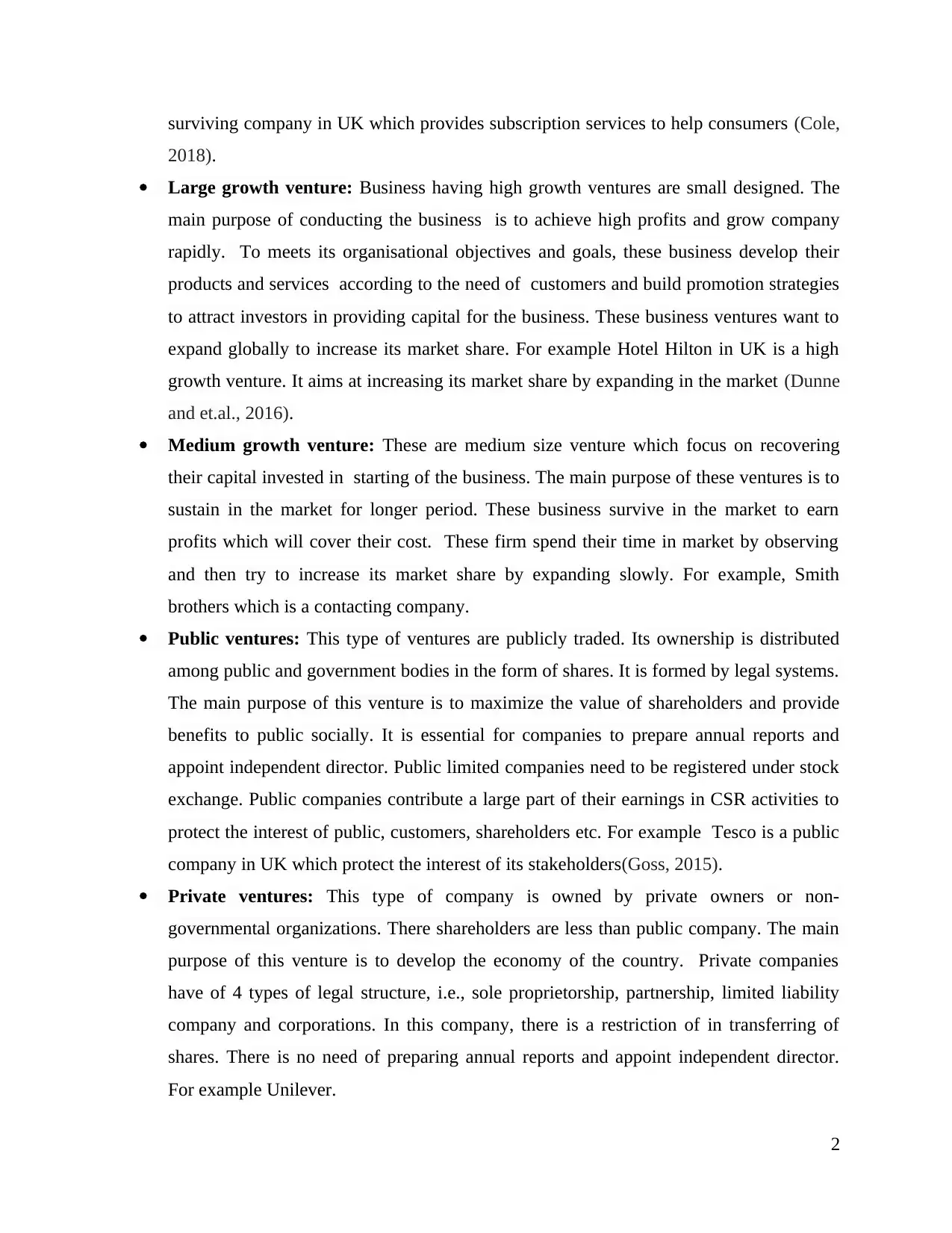
surviving company in UK which provides subscription services to help consumers (Cole,
2018).
Large growth venture: Business having high growth ventures are small designed. The
main purpose of conducting the business is to achieve high profits and grow company
rapidly. To meets its organisational objectives and goals, these business develop their
products and services according to the need of customers and build promotion strategies
to attract investors in providing capital for the business. These business ventures want to
expand globally to increase its market share. For example Hotel Hilton in UK is a high
growth venture. It aims at increasing its market share by expanding in the market (Dunne
and et.al., 2016).
Medium growth venture: These are medium size venture which focus on recovering
their capital invested in starting of the business. The main purpose of these ventures is to
sustain in the market for longer period. These business survive in the market to earn
profits which will cover their cost. These firm spend their time in market by observing
and then try to increase its market share by expanding slowly. For example, Smith
brothers which is a contacting company.
Public ventures: This type of ventures are publicly traded. Its ownership is distributed
among public and government bodies in the form of shares. It is formed by legal systems.
The main purpose of this venture is to maximize the value of shareholders and provide
benefits to public socially. It is essential for companies to prepare annual reports and
appoint independent director. Public limited companies need to be registered under stock
exchange. Public companies contribute a large part of their earnings in CSR activities to
protect the interest of public, customers, shareholders etc. For example Tesco is a public
company in UK which protect the interest of its stakeholders(Goss, 2015).
Private ventures: This type of company is owned by private owners or non-
governmental organizations. There shareholders are less than public company. The main
purpose of this venture is to develop the economy of the country. Private companies
have of 4 types of legal structure, i.e., sole proprietorship, partnership, limited liability
company and corporations. In this company, there is a restriction of in transferring of
shares. There is no need of preparing annual reports and appoint independent director.
For example Unilever.
2
2018).
Large growth venture: Business having high growth ventures are small designed. The
main purpose of conducting the business is to achieve high profits and grow company
rapidly. To meets its organisational objectives and goals, these business develop their
products and services according to the need of customers and build promotion strategies
to attract investors in providing capital for the business. These business ventures want to
expand globally to increase its market share. For example Hotel Hilton in UK is a high
growth venture. It aims at increasing its market share by expanding in the market (Dunne
and et.al., 2016).
Medium growth venture: These are medium size venture which focus on recovering
their capital invested in starting of the business. The main purpose of these ventures is to
sustain in the market for longer period. These business survive in the market to earn
profits which will cover their cost. These firm spend their time in market by observing
and then try to increase its market share by expanding slowly. For example, Smith
brothers which is a contacting company.
Public ventures: This type of ventures are publicly traded. Its ownership is distributed
among public and government bodies in the form of shares. It is formed by legal systems.
The main purpose of this venture is to maximize the value of shareholders and provide
benefits to public socially. It is essential for companies to prepare annual reports and
appoint independent director. Public limited companies need to be registered under stock
exchange. Public companies contribute a large part of their earnings in CSR activities to
protect the interest of public, customers, shareholders etc. For example Tesco is a public
company in UK which protect the interest of its stakeholders(Goss, 2015).
Private ventures: This type of company is owned by private owners or non-
governmental organizations. There shareholders are less than public company. The main
purpose of this venture is to develop the economy of the country. Private companies
have of 4 types of legal structure, i.e., sole proprietorship, partnership, limited liability
company and corporations. In this company, there is a restriction of in transferring of
shares. There is no need of preparing annual reports and appoint independent director.
For example Unilever.
2
Paraphrase This Document
Need a fresh take? Get an instant paraphrase of this document with our AI Paraphraser
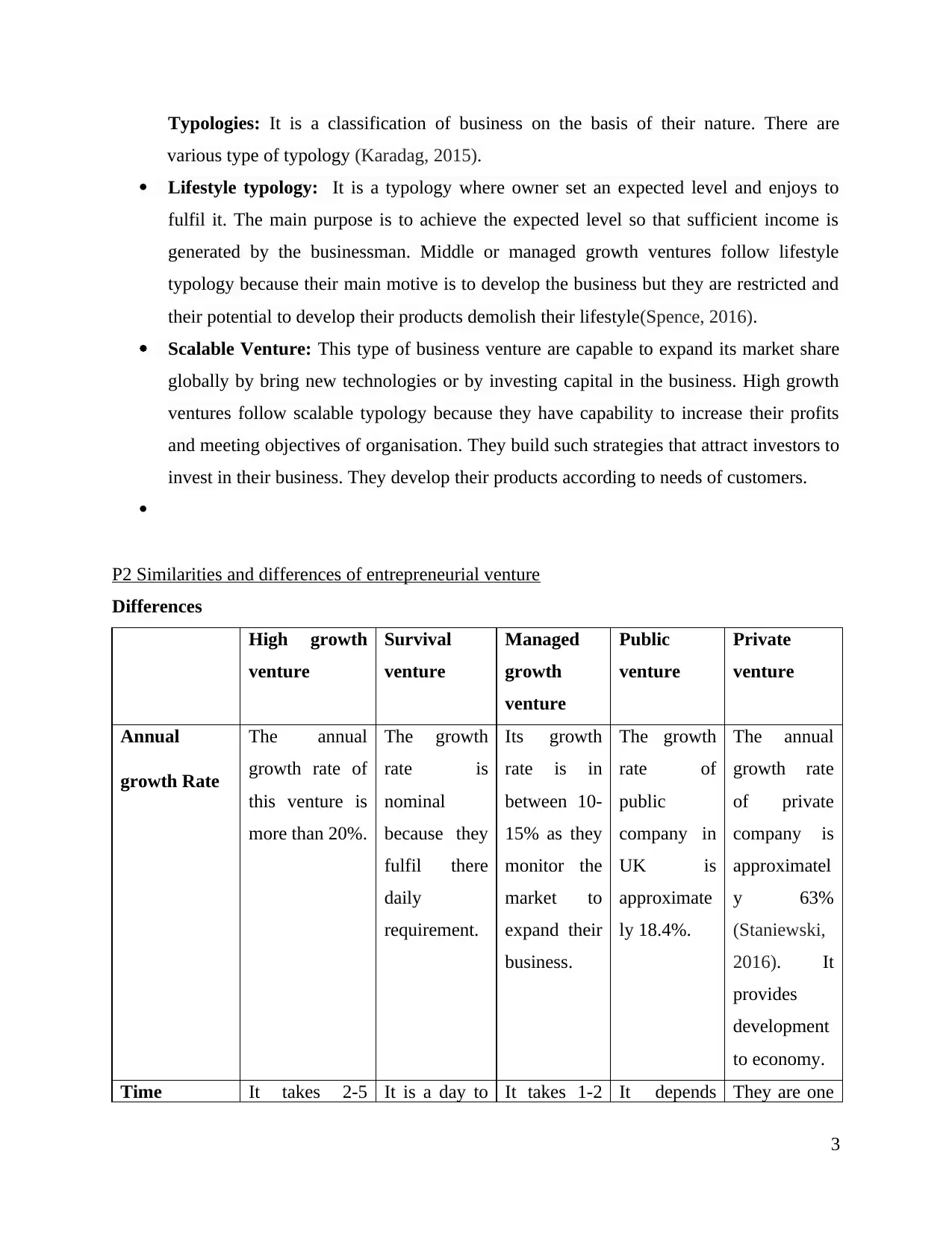
Typologies: It is a classification of business on the basis of their nature. There are
various type of typology (Karadag, 2015).
Lifestyle typology: It is a typology where owner set an expected level and enjoys to
fulfil it. The main purpose is to achieve the expected level so that sufficient income is
generated by the businessman. Middle or managed growth ventures follow lifestyle
typology because their main motive is to develop the business but they are restricted and
their potential to develop their products demolish their lifestyle(Spence, 2016).
Scalable Venture: This type of business venture are capable to expand its market share
globally by bring new technologies or by investing capital in the business. High growth
ventures follow scalable typology because they have capability to increase their profits
and meeting objectives of organisation. They build such strategies that attract investors to
invest in their business. They develop their products according to needs of customers.
P2 Similarities and differences of entrepreneurial venture
Differences
High growth
venture
Survival
venture
Managed
growth
venture
Public
venture
Private
venture
Annual
growth Rate
The annual
growth rate of
this venture is
more than 20%.
The growth
rate is
nominal
because they
fulfil there
daily
requirement.
Its growth
rate is in
between 10-
15% as they
monitor the
market to
expand their
business.
The growth
rate of
public
company in
UK is
approximate
ly 18.4%.
The annual
growth rate
of private
company is
approximatel
y 63%
(Staniewski,
2016). It
provides
development
to economy.
Time It takes 2-5 It is a day to It takes 1-2 It depends They are one
3
various type of typology (Karadag, 2015).
Lifestyle typology: It is a typology where owner set an expected level and enjoys to
fulfil it. The main purpose is to achieve the expected level so that sufficient income is
generated by the businessman. Middle or managed growth ventures follow lifestyle
typology because their main motive is to develop the business but they are restricted and
their potential to develop their products demolish their lifestyle(Spence, 2016).
Scalable Venture: This type of business venture are capable to expand its market share
globally by bring new technologies or by investing capital in the business. High growth
ventures follow scalable typology because they have capability to increase their profits
and meeting objectives of organisation. They build such strategies that attract investors to
invest in their business. They develop their products according to needs of customers.
P2 Similarities and differences of entrepreneurial venture
Differences
High growth
venture
Survival
venture
Managed
growth
venture
Public
venture
Private
venture
Annual
growth Rate
The annual
growth rate of
this venture is
more than 20%.
The growth
rate is
nominal
because they
fulfil there
daily
requirement.
Its growth
rate is in
between 10-
15% as they
monitor the
market to
expand their
business.
The growth
rate of
public
company in
UK is
approximate
ly 18.4%.
The annual
growth rate
of private
company is
approximatel
y 63%
(Staniewski,
2016). It
provides
development
to economy.
Time It takes 2-5 It is a day to It takes 1-2 It depends They are one
3

Horizon
years to
expands its
business.
day process. years. on the
company's
nature that
how much
time they
take in
creating
value.
of the fastest
growing
ventures.
Managerial
focus
Managers of
company focus
on expanding
their business
in global
markets.
Manager
focus on
selling
everything
that company
produce.
Managers
focus on
building
strategies to
increase its
business.
Managers
focus on
social
benefits.
Managers
focus on
development
of economy
and company
as well.
Entrepreneur
orientation
High growth
venture possess
high
orientation
Survival
ventures
possess
very--low
orientation
Managed
growth
venture
possess
moderate
entrepreneur
ial
orientation(
Storey,
2016)
Low
orientation
as it is
owned by
government
bodies
High
entrepreneuri
al orientation
Technology
Investment
There is a high
technological
investment in
these business
ventures.
There is no
technological
investment.
There is a
moderate
investment
in the
technology.
There is
average
investment
in
technologies
.
There is high
investment
in
technologies.
Exit These ventures For survival They Public Private
4
years to
expands its
business.
day process. years. on the
company's
nature that
how much
time they
take in
creating
value.
of the fastest
growing
ventures.
Managerial
focus
Managers of
company focus
on expanding
their business
in global
markets.
Manager
focus on
selling
everything
that company
produce.
Managers
focus on
building
strategies to
increase its
business.
Managers
focus on
social
benefits.
Managers
focus on
development
of economy
and company
as well.
Entrepreneur
orientation
High growth
venture possess
high
orientation
Survival
ventures
possess
very--low
orientation
Managed
growth
venture
possess
moderate
entrepreneur
ial
orientation(
Storey,
2016)
Low
orientation
as it is
owned by
government
bodies
High
entrepreneuri
al orientation
Technology
Investment
There is a high
technological
investment in
these business
ventures.
There is no
technological
investment.
There is a
moderate
investment
in the
technology.
There is
average
investment
in
technologies
.
There is high
investment
in
technologies.
Exit These ventures For survival They Public Private
4
⊘ This is a preview!⊘
Do you want full access?
Subscribe today to unlock all pages.

Trusted by 1+ million students worldwide
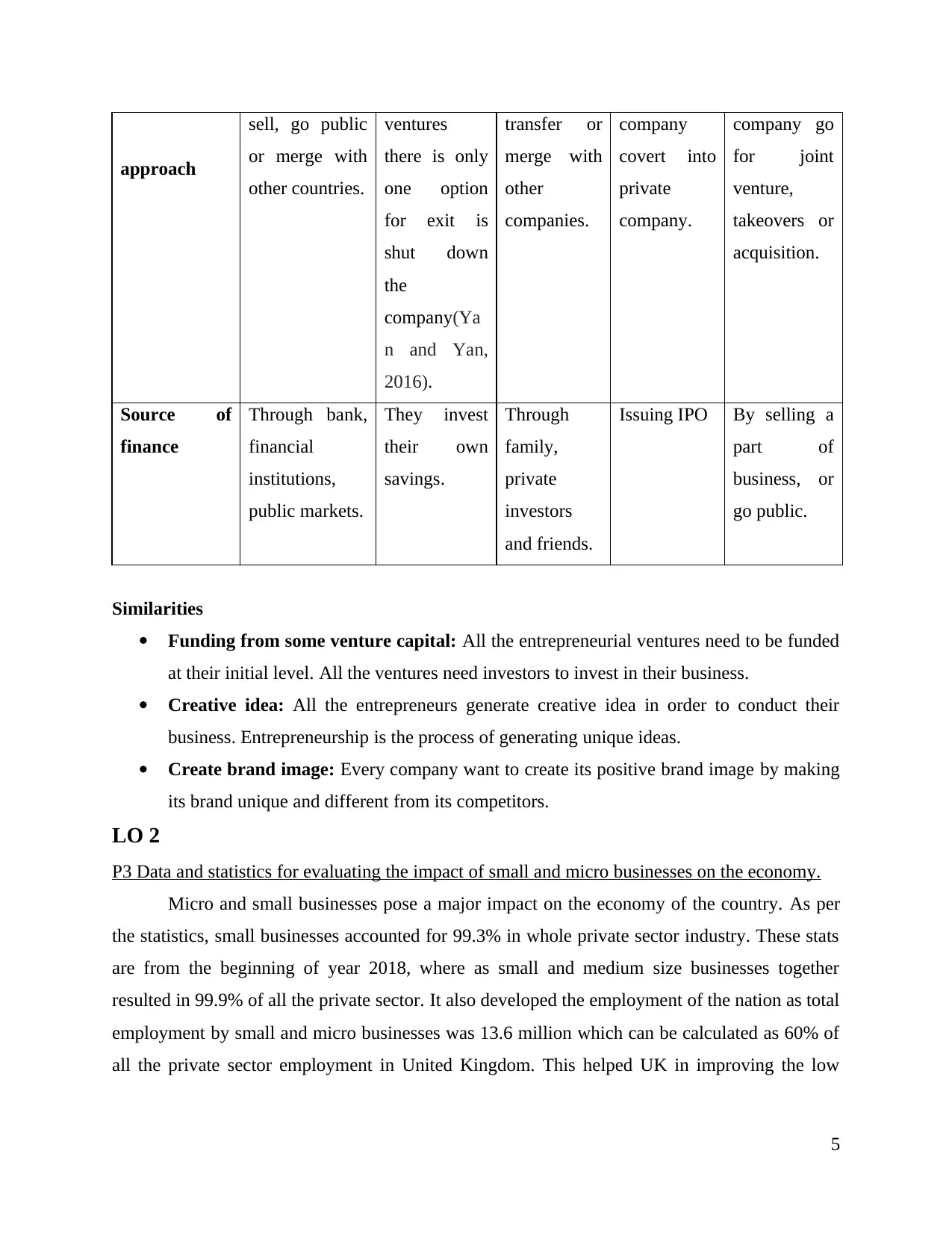
approach
sell, go public
or merge with
other countries.
ventures
there is only
one option
for exit is
shut down
the
company(Ya
n and Yan,
2016).
transfer or
merge with
other
companies.
company
covert into
private
company.
company go
for joint
venture,
takeovers or
acquisition.
Source of
finance
Through bank,
financial
institutions,
public markets.
They invest
their own
savings.
Through
family,
private
investors
and friends.
Issuing IPO By selling a
part of
business, or
go public.
Similarities
Funding from some venture capital: All the entrepreneurial ventures need to be funded
at their initial level. All the ventures need investors to invest in their business.
Creative idea: All the entrepreneurs generate creative idea in order to conduct their
business. Entrepreneurship is the process of generating unique ideas.
Create brand image: Every company want to create its positive brand image by making
its brand unique and different from its competitors.
LO 2
P3 Data and statistics for evaluating the impact of small and micro businesses on the economy.
Micro and small businesses pose a major impact on the economy of the country. As per
the statistics, small businesses accounted for 99.3% in whole private sector industry. These stats
are from the beginning of year 2018, where as small and medium size businesses together
resulted in 99.9% of all the private sector. It also developed the employment of the nation as total
employment by small and micro businesses was 13.6 million which can be calculated as 60% of
all the private sector employment in United Kingdom. This helped UK in improving the low
5
sell, go public
or merge with
other countries.
ventures
there is only
one option
for exit is
shut down
the
company(Ya
n and Yan,
2016).
transfer or
merge with
other
companies.
company
covert into
private
company.
company go
for joint
venture,
takeovers or
acquisition.
Source of
finance
Through bank,
financial
institutions,
public markets.
They invest
their own
savings.
Through
family,
private
investors
and friends.
Issuing IPO By selling a
part of
business, or
go public.
Similarities
Funding from some venture capital: All the entrepreneurial ventures need to be funded
at their initial level. All the ventures need investors to invest in their business.
Creative idea: All the entrepreneurs generate creative idea in order to conduct their
business. Entrepreneurship is the process of generating unique ideas.
Create brand image: Every company want to create its positive brand image by making
its brand unique and different from its competitors.
LO 2
P3 Data and statistics for evaluating the impact of small and micro businesses on the economy.
Micro and small businesses pose a major impact on the economy of the country. As per
the statistics, small businesses accounted for 99.3% in whole private sector industry. These stats
are from the beginning of year 2018, where as small and medium size businesses together
resulted in 99.9% of all the private sector. It also developed the employment of the nation as total
employment by small and micro businesses was 13.6 million which can be calculated as 60% of
all the private sector employment in United Kingdom. This helped UK in improving the low
5
Paraphrase This Document
Need a fresh take? Get an instant paraphrase of this document with our AI Paraphraser

productivity level which was the key challenge for the nation for generating growth in the
economy of the country (Zahra and Wright, 2016).
In the year 2018, there were around 1.4 million of employing businesses with more than
4.3 million of non employing businesses, which shows that more than 75% of businesses does
not employ anyone other than owner of the businesses. The overall population of business in UK
consist of three major legal forms which includes three main aspects. Firstly, the sole
proprietorships calculated were 3.4 million which was 59% of the total. Secondly, companies
were calculated to 1.9 million of all which was 34% of total and lastly it includes ordinary
partnerships which were estimated to 405,000 that was 7% of all(UK SME data, stats & charts,
2018) .
6
economy of the country (Zahra and Wright, 2016).
In the year 2018, there were around 1.4 million of employing businesses with more than
4.3 million of non employing businesses, which shows that more than 75% of businesses does
not employ anyone other than owner of the businesses. The overall population of business in UK
consist of three major legal forms which includes three main aspects. Firstly, the sole
proprietorships calculated were 3.4 million which was 59% of the total. Secondly, companies
were calculated to 1.9 million of all which was 34% of total and lastly it includes ordinary
partnerships which were estimated to 405,000 that was 7% of all(UK SME data, stats & charts,
2018) .
6

Illustration 1: UK SME Data, Stats & Charts
( Source: UK SME Data, Stats & Charts, 2018)
There was a recent trend in the business population of UK between the year 2000 to 2017
as there was a sustained increase in the business populations every year, whereas in a recent
period of time there was a fall of around 27,000 of businesses which can be calculated around
0.5%, this took place in between of year 2017 to 2018. There were still a growth showed in year
2000 in businesses as around 2.2 million more businesses were found than in 2000 which was a
increase of 63%. Since year 2000, majority in growth of population was notices which accounted
for around 87% of the overall increase due to non employing businesses. These statistics and
data play a significant role in development of economy of UK. In the year 2017 and 2018, there
was a increase in number of business which provide employment opportunities on a large scale,
7
( Source: UK SME Data, Stats & Charts, 2018)
There was a recent trend in the business population of UK between the year 2000 to 2017
as there was a sustained increase in the business populations every year, whereas in a recent
period of time there was a fall of around 27,000 of businesses which can be calculated around
0.5%, this took place in between of year 2017 to 2018. There were still a growth showed in year
2000 in businesses as around 2.2 million more businesses were found than in 2000 which was a
increase of 63%. Since year 2000, majority in growth of population was notices which accounted
for around 87% of the overall increase due to non employing businesses. These statistics and
data play a significant role in development of economy of UK. In the year 2017 and 2018, there
was a increase in number of business which provide employment opportunities on a large scale,
7
⊘ This is a preview!⊘
Do you want full access?
Subscribe today to unlock all pages.

Trusted by 1+ million students worldwide
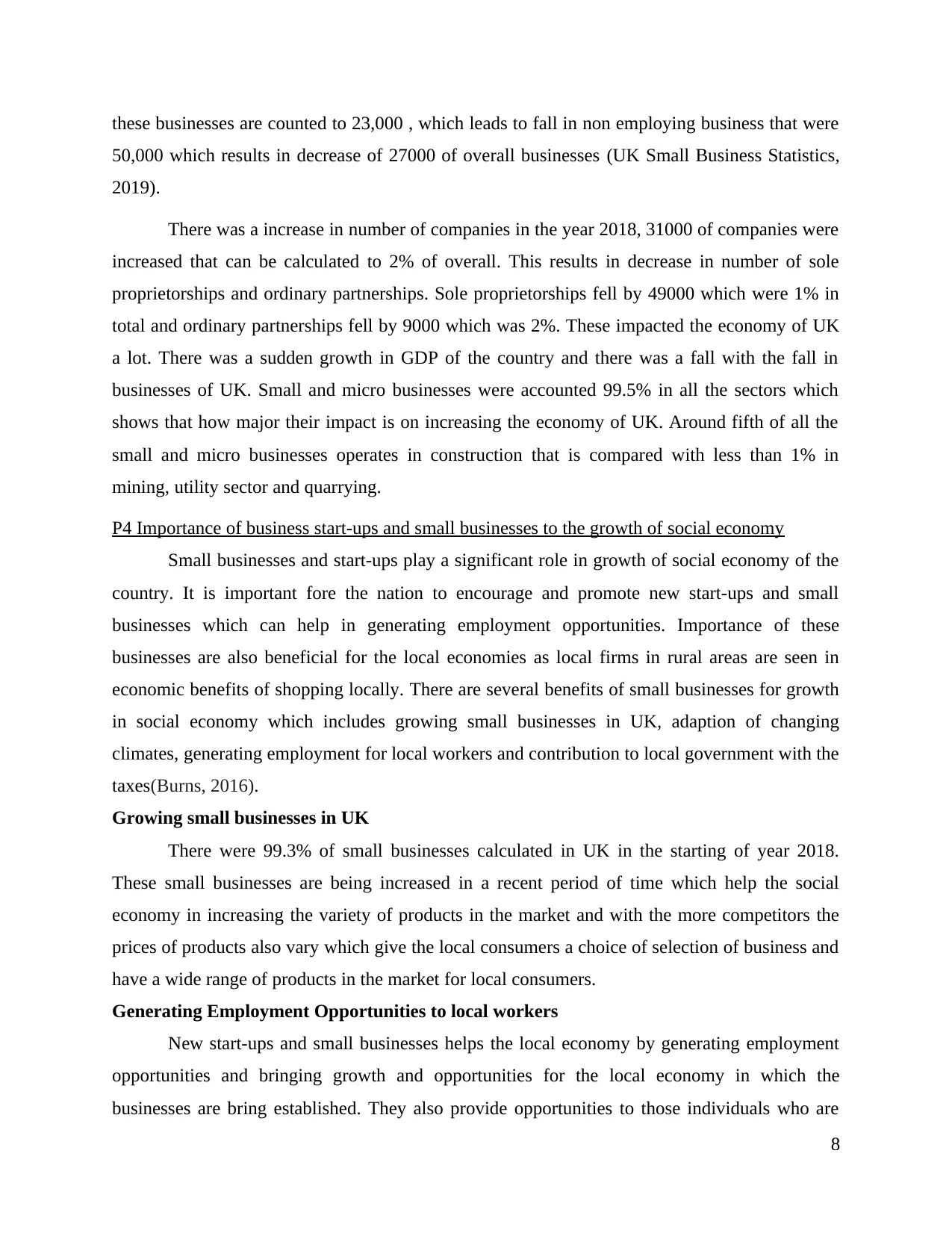
these businesses are counted to 23,000 , which leads to fall in non employing business that were
50,000 which results in decrease of 27000 of overall businesses (UK Small Business Statistics,
2019).
There was a increase in number of companies in the year 2018, 31000 of companies were
increased that can be calculated to 2% of overall. This results in decrease in number of sole
proprietorships and ordinary partnerships. Sole proprietorships fell by 49000 which were 1% in
total and ordinary partnerships fell by 9000 which was 2%. These impacted the economy of UK
a lot. There was a sudden growth in GDP of the country and there was a fall with the fall in
businesses of UK. Small and micro businesses were accounted 99.5% in all the sectors which
shows that how major their impact is on increasing the economy of UK. Around fifth of all the
small and micro businesses operates in construction that is compared with less than 1% in
mining, utility sector and quarrying.
P4 Importance of business start-ups and small businesses to the growth of social economy
Small businesses and start-ups play a significant role in growth of social economy of the
country. It is important fore the nation to encourage and promote new start-ups and small
businesses which can help in generating employment opportunities. Importance of these
businesses are also beneficial for the local economies as local firms in rural areas are seen in
economic benefits of shopping locally. There are several benefits of small businesses for growth
in social economy which includes growing small businesses in UK, adaption of changing
climates, generating employment for local workers and contribution to local government with the
taxes(Burns, 2016).
Growing small businesses in UK
There were 99.3% of small businesses calculated in UK in the starting of year 2018.
These small businesses are being increased in a recent period of time which help the social
economy in increasing the variety of products in the market and with the more competitors the
prices of products also vary which give the local consumers a choice of selection of business and
have a wide range of products in the market for local consumers.
Generating Employment Opportunities to local workers
New start-ups and small businesses helps the local economy by generating employment
opportunities and bringing growth and opportunities for the local economy in which the
businesses are bring established. They also provide opportunities to those individuals who are
8
50,000 which results in decrease of 27000 of overall businesses (UK Small Business Statistics,
2019).
There was a increase in number of companies in the year 2018, 31000 of companies were
increased that can be calculated to 2% of overall. This results in decrease in number of sole
proprietorships and ordinary partnerships. Sole proprietorships fell by 49000 which were 1% in
total and ordinary partnerships fell by 9000 which was 2%. These impacted the economy of UK
a lot. There was a sudden growth in GDP of the country and there was a fall with the fall in
businesses of UK. Small and micro businesses were accounted 99.5% in all the sectors which
shows that how major their impact is on increasing the economy of UK. Around fifth of all the
small and micro businesses operates in construction that is compared with less than 1% in
mining, utility sector and quarrying.
P4 Importance of business start-ups and small businesses to the growth of social economy
Small businesses and start-ups play a significant role in growth of social economy of the
country. It is important fore the nation to encourage and promote new start-ups and small
businesses which can help in generating employment opportunities. Importance of these
businesses are also beneficial for the local economies as local firms in rural areas are seen in
economic benefits of shopping locally. There are several benefits of small businesses for growth
in social economy which includes growing small businesses in UK, adaption of changing
climates, generating employment for local workers and contribution to local government with the
taxes(Burns, 2016).
Growing small businesses in UK
There were 99.3% of small businesses calculated in UK in the starting of year 2018.
These small businesses are being increased in a recent period of time which help the social
economy in increasing the variety of products in the market and with the more competitors the
prices of products also vary which give the local consumers a choice of selection of business and
have a wide range of products in the market for local consumers.
Generating Employment Opportunities to local workers
New start-ups and small businesses helps the local economy by generating employment
opportunities and bringing growth and opportunities for the local economy in which the
businesses are bring established. They also provide opportunities to those individuals who are
8
Paraphrase This Document
Need a fresh take? Get an instant paraphrase of this document with our AI Paraphraser
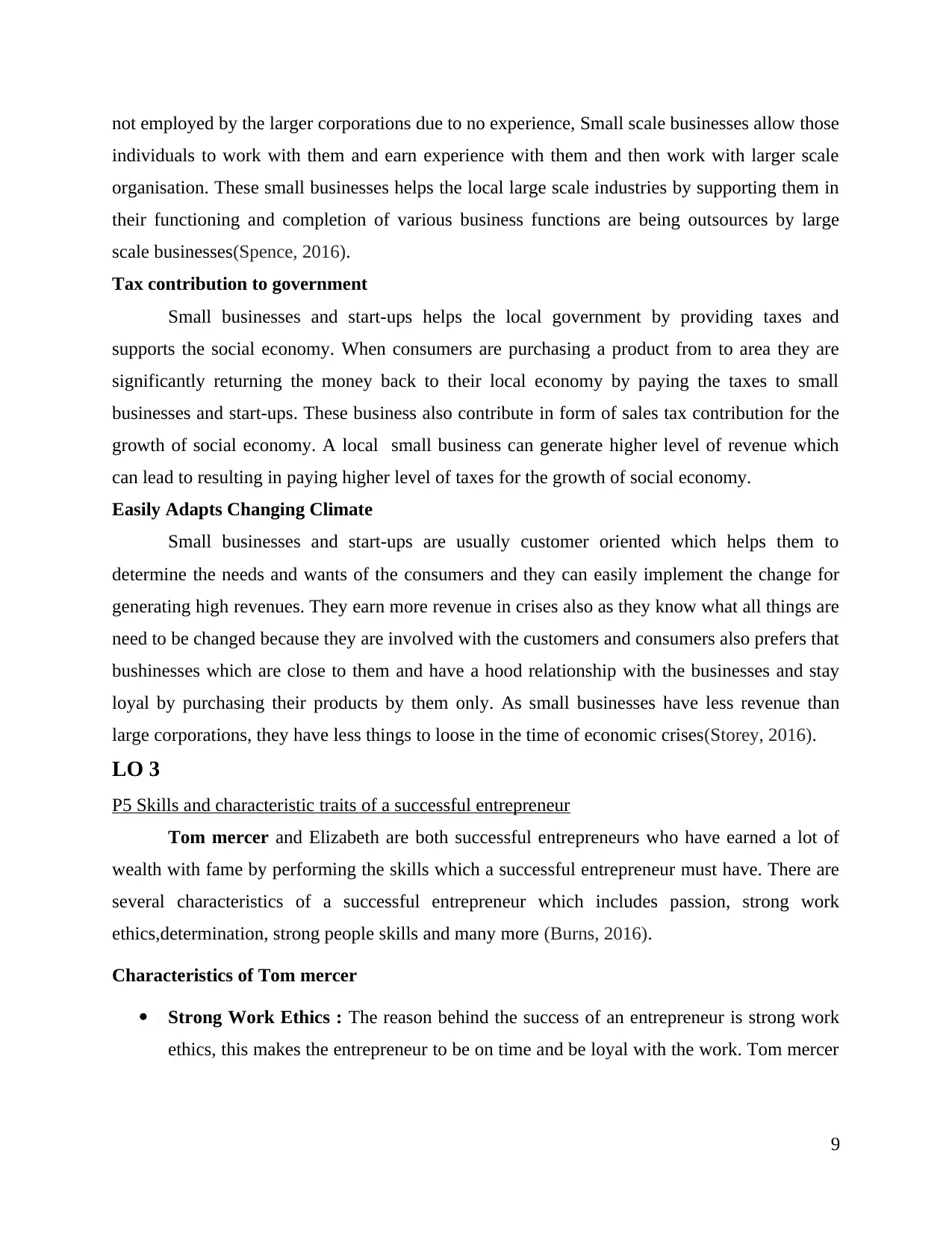
not employed by the larger corporations due to no experience, Small scale businesses allow those
individuals to work with them and earn experience with them and then work with larger scale
organisation. These small businesses helps the local large scale industries by supporting them in
their functioning and completion of various business functions are being outsources by large
scale businesses(Spence, 2016).
Tax contribution to government
Small businesses and start-ups helps the local government by providing taxes and
supports the social economy. When consumers are purchasing a product from to area they are
significantly returning the money back to their local economy by paying the taxes to small
businesses and start-ups. These business also contribute in form of sales tax contribution for the
growth of social economy. A local small business can generate higher level of revenue which
can lead to resulting in paying higher level of taxes for the growth of social economy.
Easily Adapts Changing Climate
Small businesses and start-ups are usually customer oriented which helps them to
determine the needs and wants of the consumers and they can easily implement the change for
generating high revenues. They earn more revenue in crises also as they know what all things are
need to be changed because they are involved with the customers and consumers also prefers that
bushinesses which are close to them and have a hood relationship with the businesses and stay
loyal by purchasing their products by them only. As small businesses have less revenue than
large corporations, they have less things to loose in the time of economic crises(Storey, 2016).
LO 3
P5 Skills and characteristic traits of a successful entrepreneur
Tom mercer and Elizabeth are both successful entrepreneurs who have earned a lot of
wealth with fame by performing the skills which a successful entrepreneur must have. There are
several characteristics of a successful entrepreneur which includes passion, strong work
ethics,determination, strong people skills and many more (Burns, 2016).
Characteristics of Tom mercer
Strong Work Ethics : The reason behind the success of an entrepreneur is strong work
ethics, this makes the entrepreneur to be on time and be loyal with the work. Tom mercer
9
individuals to work with them and earn experience with them and then work with larger scale
organisation. These small businesses helps the local large scale industries by supporting them in
their functioning and completion of various business functions are being outsources by large
scale businesses(Spence, 2016).
Tax contribution to government
Small businesses and start-ups helps the local government by providing taxes and
supports the social economy. When consumers are purchasing a product from to area they are
significantly returning the money back to their local economy by paying the taxes to small
businesses and start-ups. These business also contribute in form of sales tax contribution for the
growth of social economy. A local small business can generate higher level of revenue which
can lead to resulting in paying higher level of taxes for the growth of social economy.
Easily Adapts Changing Climate
Small businesses and start-ups are usually customer oriented which helps them to
determine the needs and wants of the consumers and they can easily implement the change for
generating high revenues. They earn more revenue in crises also as they know what all things are
need to be changed because they are involved with the customers and consumers also prefers that
bushinesses which are close to them and have a hood relationship with the businesses and stay
loyal by purchasing their products by them only. As small businesses have less revenue than
large corporations, they have less things to loose in the time of economic crises(Storey, 2016).
LO 3
P5 Skills and characteristic traits of a successful entrepreneur
Tom mercer and Elizabeth are both successful entrepreneurs who have earned a lot of
wealth with fame by performing the skills which a successful entrepreneur must have. There are
several characteristics of a successful entrepreneur which includes passion, strong work
ethics,determination, strong people skills and many more (Burns, 2016).
Characteristics of Tom mercer
Strong Work Ethics : The reason behind the success of an entrepreneur is strong work
ethics, this makes the entrepreneur to be on time and be loyal with the work. Tom mercer
9
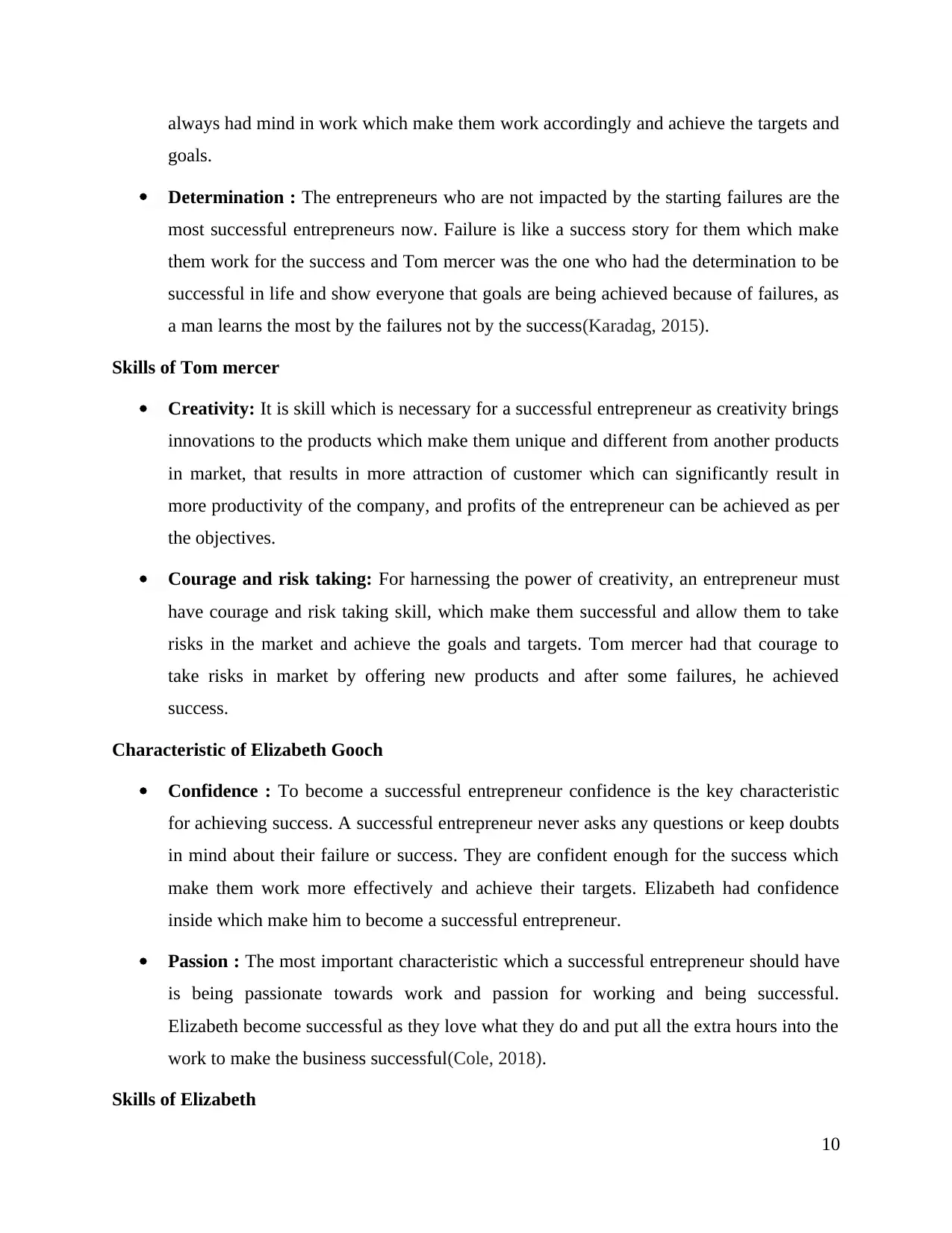
always had mind in work which make them work accordingly and achieve the targets and
goals.
Determination : The entrepreneurs who are not impacted by the starting failures are the
most successful entrepreneurs now. Failure is like a success story for them which make
them work for the success and Tom mercer was the one who had the determination to be
successful in life and show everyone that goals are being achieved because of failures, as
a man learns the most by the failures not by the success(Karadag, 2015).
Skills of Tom mercer
Creativity: It is skill which is necessary for a successful entrepreneur as creativity brings
innovations to the products which make them unique and different from another products
in market, that results in more attraction of customer which can significantly result in
more productivity of the company, and profits of the entrepreneur can be achieved as per
the objectives.
Courage and risk taking: For harnessing the power of creativity, an entrepreneur must
have courage and risk taking skill, which make them successful and allow them to take
risks in the market and achieve the goals and targets. Tom mercer had that courage to
take risks in market by offering new products and after some failures, he achieved
success.
Characteristic of Elizabeth Gooch
Confidence : To become a successful entrepreneur confidence is the key characteristic
for achieving success. A successful entrepreneur never asks any questions or keep doubts
in mind about their failure or success. They are confident enough for the success which
make them work more effectively and achieve their targets. Elizabeth had confidence
inside which make him to become a successful entrepreneur.
Passion : The most important characteristic which a successful entrepreneur should have
is being passionate towards work and passion for working and being successful.
Elizabeth become successful as they love what they do and put all the extra hours into the
work to make the business successful(Cole, 2018).
Skills of Elizabeth
10
goals.
Determination : The entrepreneurs who are not impacted by the starting failures are the
most successful entrepreneurs now. Failure is like a success story for them which make
them work for the success and Tom mercer was the one who had the determination to be
successful in life and show everyone that goals are being achieved because of failures, as
a man learns the most by the failures not by the success(Karadag, 2015).
Skills of Tom mercer
Creativity: It is skill which is necessary for a successful entrepreneur as creativity brings
innovations to the products which make them unique and different from another products
in market, that results in more attraction of customer which can significantly result in
more productivity of the company, and profits of the entrepreneur can be achieved as per
the objectives.
Courage and risk taking: For harnessing the power of creativity, an entrepreneur must
have courage and risk taking skill, which make them successful and allow them to take
risks in the market and achieve the goals and targets. Tom mercer had that courage to
take risks in market by offering new products and after some failures, he achieved
success.
Characteristic of Elizabeth Gooch
Confidence : To become a successful entrepreneur confidence is the key characteristic
for achieving success. A successful entrepreneur never asks any questions or keep doubts
in mind about their failure or success. They are confident enough for the success which
make them work more effectively and achieve their targets. Elizabeth had confidence
inside which make him to become a successful entrepreneur.
Passion : The most important characteristic which a successful entrepreneur should have
is being passionate towards work and passion for working and being successful.
Elizabeth become successful as they love what they do and put all the extra hours into the
work to make the business successful(Cole, 2018).
Skills of Elizabeth
10
⊘ This is a preview!⊘
Do you want full access?
Subscribe today to unlock all pages.

Trusted by 1+ million students worldwide
1 out of 17
Related Documents
Your All-in-One AI-Powered Toolkit for Academic Success.
+13062052269
info@desklib.com
Available 24*7 on WhatsApp / Email
![[object Object]](/_next/static/media/star-bottom.7253800d.svg)
Unlock your academic potential
Copyright © 2020–2026 A2Z Services. All Rights Reserved. Developed and managed by ZUCOL.




